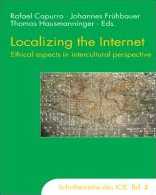|
|PROGRAMME|
Sunday, October 3
19:00
Welcome Dinner at Dorint Hotel
Monday, October 4
10:00
- 10:30 Welcome Addresses:
Peter
Weibel (Director
of ZKM)
Rafael
Capurro (Hochschule
der Medien, Stuttgart)
10.30
- 11.00 Rafael
Capurro: Intercultural Information Ethics.
I. Internet for Social Development: Community Building
11:00
- 11:30 Daniel
Pimienta (President, Fundación Funredes, Dominican
Republic): At the Boundaries of Ethics and Cultures: Virtual Community
as an Open Ended Process Carrying the Will for Social Change.
11:30
- 13:00 Lunch
13:00
- 13:30 Susana
Finquelievich (Universidad de Buenos Aires, Argentina): A
Toolkit to Empower Communities in Latin America.
13:30
- 14:00 Makoto
Nakada (University of Tsukuba, Japan): The Internet
Within Seken as Old and Indigenous World of Meaning in
Japan.
14:00
- 14:30 Vikas
Nath (Policy Analyst, UN Development Programme): Weaving
Politically-relevant and Inclusive Community networks: How Internet is
Changing Information Flows In Developing Countries. With case-studies
from Asian Communities.
14:30
- 17:00 Working groups: Basic Issues (Chairs: Herman T. Tavani, Bernd
Frohmann, Thomas J. Froehlich)
17:00
- 17:30 Coffee break
17:30
- 18:30 Plenum (Chair: Charles Ess)
20:00
Dinner at Dorint Hotel
Tuesday, October 5
II. Internet for Cultural Development: Restructuring
the Media
9:30
- 10:00 Willy
Jackson (Université Paris 7 / Cameroun) & Issiaka
Mandé (Université Paris 7 / Burkina Faso): „New
Technologies“ and „Ancient Africa“: the Impact of New Information and
Communication Technologies in Sub-Saharian Africa.
10:00
- 12:00 Working groups: Internet for Social and Political Development
(Chairs: Frances S. Grodzinsky, Vikas Nath, Richard A. Spinello)
12:00
- 13:30 Lunch
13:30
- 14:00 Charles
Ess (Drury University, USA): Can the Local Reshape the Global?
Ethical Imperatives for Humane Intercultural Communication Online -
Views from the Centers and the Margins.
14:00
- 14:30 Wolfgang
Coy (Humboldt-Universität zu Berlin): On Sharing
Intellectual Properties in Global Communities.
14:30
- 16:00 Working groups: Internet for Cultural Development (Chairs: Paul
Sturges, Kenneth Einer Himma, Toni Samek)
16:00
- 16:30 Coffee break
16:30
- 18:00 Plenum (Chair: Thomas J. Froehlich)
19:00
Reception at Karlsruhe
Town Hall
Wednesday, October 6
III. Internet for Economic Development: Empowering the
People
9:30
- 10:00 Michel
Menou (Paris/City University, London, UK): Buzzwords and
Indicators About the Networked Society: Metaphor, Vacuity or Fraud?
10:00
- 12:00 Working groups: Internet for Economic Development (Chairs:
Johannes Britz, Wolfgang Coy, Daniel Pimienta)
12:00
- 13:00 Plenum (Chair: Lucas D. Introna)
13:00
- 14:00 Lunch
14:00
- 15:00 ICIE Meeting
Optional:
Visit to ZKM-Museum or
to the Landesmuseum at
Karlsruhe Castle.
Last update: May 24, 2005
|













